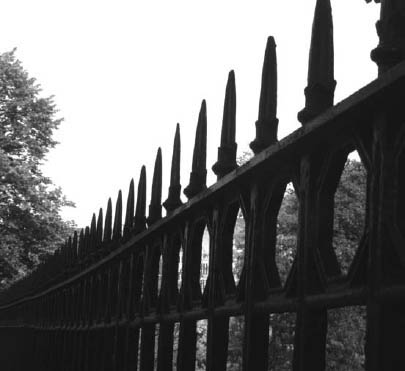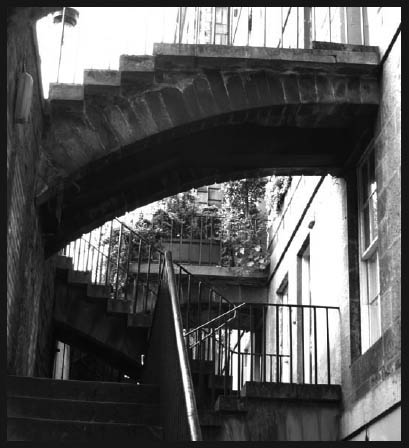The Black Book (41 page)
Authors: Ian Rankin
Do the flashes of gallows humour as often shown by the pathologists but sometimes also in Rebus’s own comments increase or dissipate narrative tension? Does Rebus use black comedy for the same reasons the pathologists do?

Do Rebus’s personal vulnerabilities make him understanding of the frailties of others?

How does the characterisation of Rebus compare to other long-standing popular detectives from British authors such as Holmes, Poirot, Morse or Dalgleish? And are there more similarities or differences between them?

 THE BLACK BOOK
THE BLACK BOOKConvinced now that he is writing a series, Ian Rankin introduces a new level of humour into his story as he takes Rebus into his first head-to-head with Big Ger Cafferty.
But at first Rebus believes he’s investigating a murder in a butcher’s shop that belongs to one Jim Bone, although the powers that be are more interested in co-opting him on to Operation Moneybags, a joint operation with Trading Standards to investigate a money-lending scam (with some protection on the side). And when DS Brian Holmes is badly injured at the Elvis-themed Heartbreak Café, it’s not long before Rebus and new colleague DC Siobhan Clarke are plunged into unravelling a labyrinthine mix of an old rent-boy scandal, an insurance fraud, a murdered body found five years earlier in the ashes of the Central Hotel, Nationalist politics with the Scottish Sword and Shield and, of course, the protection racket …
Meanwhile Rebus’s relationship with Dr Patience Aitken has hit a rocky patch, and ex-con brother Michael drops by; then there’s the arrival of an illicit weapon to further complicate things. And so Rebus finds himself veering between the sublime and the ridiculous as he slowly pieces the puzzle together, only to end up in an evenly balanced confrontation with Big Ger, the first of many the reader will savour.
 Discussion points for
Discussion points forThe Black Book
The Black Book
is the first time Ian Rankin moves Rebus to a real-life police station and mentions the street where he lives. Is this new level of authenticity reflected in any other areas?

When Rebus meets former Parachute Regiment colleague Deek Torrance he’s reminded of ‘the whole black comedy of his past’. Is this better in Rebus’s eyes than his past being a ‘tragedy’, or does he feel there actually might not be too much of a difference?

Is the fact that DS Brian Holmes has his own unofficial notebook with jottings on unofficial lines of enquiry indicative of the time he has spent working with Rebus? Does the ‘black book’ of the title refer more to Holmes’s notebook, to Big Ger’s diary or to Black Aengus’s journal?

Characters from previous Rebus novels reappear. Does Ian Rankin make allowances for readers who might not have read the earlier books? Discuss the different sorts of ‘ghosts from the past’.

Is Michael similar to Rebus in that he treats the thought of ‘scary’ things with humour?

‘
The past was certainly important to Edinburgh. The city fed on its past like a serpent with its tail in its mouth. And Rebus’s past seemed to be circling around again too
.’ How does Ian Rankin explore these notions, and why does the reader feel a sense of threat?

Ian Rankin claims that by the end of
The Black Book
, newcomer DC Siobhan Clarke has usurped Brian Holmes: ‘
It was not in Siobhan’s mind to remain “just another colleague”; she seemed to have other ideas entirely
’. How does this play out on the page, and in what ways does she prove herself to Rebus?